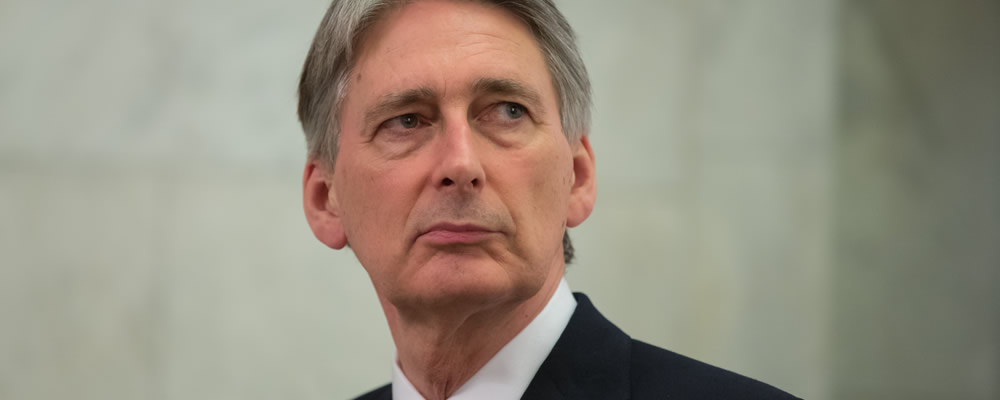- Pound Euro Exchange Rate at 1.12 – Pair could advance to 1.13 this week
- Pound Holds Ground despite Poor Borrowing Stats – Sterling firm ahead of Autumn Budget
- GBP Forecast: Autumn Budget on Wednesday – Will Hammond offer relief to consumers?
- EUR Forecast: Eurozone PMIs Ahead – German political news could cause movement too
Investors largely held onto Monday’s Pound Euro exchange rate gains on Tuesday, despite a disappointing UK public sector net borrowing report. A lack of demand for the Euro, as well as market anticipation for Wednesday’s UK Autumn Budget, kept the pair appealing.
GBP EUR began the week trending at the level of 1.1206. The pair has since climbed almost a cent, briefly hitting a high of 1.1305 on Tuesday but generally trending close below the level of 1.13.
Pound (GBP) Weighed by Disappointing Deficit Stats
Investors bought the Pound on Monday in anticipation for progress in Brexit talks, as well as hopes that Wednesday’s Autumn Budget would give the UK economy and its consumers a boost.
However, Sterling’s advances slowed on Tuesday amid news that the government had borrowed more than expected in October, causing the deficit to worsen by £500m.
October’s UK public sector net borrowing report was forecast to worsen from £-5.33b to £-6.6b. While the previous figure was revised higher to £-4.43b, the October print came in at £-7.46b.
Excluding the impact of Britain’s state-owned banking groups, the UK borrowing figure came in at around £-8b.
According to an analyst report from Reuters;
‘Britain’s budget gap unexpectedly widened last month, underscoring finance minister Philip Hammond’s challenge as he juggles calls for more spending in his budget on Wednesday with the prospect of weaker economic growth ahead.
The deficit, excluding state-run banks, stood at £8.0bn, up 6.9% compared with October 2016, the Office for National Statistics said on Tuesday.
Rising debt costs, linked to Britain’s higher inflation since the Brexit vote, were a driver of the shortfall.’
Despite the disappointing October figure however, the year-to-date deficit showed the lowest borrowing figure since 2007.
Overall though, analysts don’t expect this report will give much leeway to UK fiscal policy. Ross Campbell, public sector director from ICAEW, stated that the report indicates that the Autumn Budget may not be hugely generous;
‘Looking at the annual trend, we are still running a large deficit which means our national debt continues to grow.’
Euro (EUR) Brushes Off German Political Uncertainty
Despite Monday news that German coalition talks had essentially collapsed, the Euro’s reaction was brief and limited, with markets largely reversing the single currency selloff by Monday evening.
On Tuesday morning, the Euro trended firmly against the Pound, even with the German political outlook shrouded in uncertainty.
According to Joerg Kraemer, chief economist from Commerzbank;
‘Uncertainty is poison for the economy. But the collapse of [coalition] talks can hardly be a shock for businesses after four agonising weeks of negotiations.
Furthermore, the German economy is currently in robust shape. Competitiveness is still high and the ECB’s loose monetary policy is stimulating demand.’
Other analysts suggested that markets could remain relatively calm on the Euro until it begins to look like German Chancellor Angela Merkel may lose her position of power, or that another undesirable outcome begins to look more likely.
On Monday afternoon, German President Frank-Walter Steinmeier urged German political parties to find an outcome in coalition talks. This reassured markets that a snap election was unlikely to be suddenly called until many other options had been explored.
As Eurozone data has been strong recently and German political parties have raised the possibility of Merkel remaining in power as a minority government, investors have seen little reason to panic-sell the Euro just yet.
Pound Euro Exchange Rate Forecast: UK Budget in Focus
Wednesday will see UK Chancellor Philip Hammond hold the highly anticipated Autumn Budget.
Despite the lack of wiggle room in Tuesday’s underwhelming UK public borrowing report, markets are still hoping that Hammond will present some form of relief to UK consumers.
For most of 2017, UK inflation has been surging due to Pound weakness and domestic wage growth has been unable to keep up. This has led to a pay squeeze that has been weighing on economic activity, as household purchasing power weakens.
If Hammond announces any fiscal measures to boost consumer confidence or consumer activity, the Pound could see some relief as investors will hope for consumer activity to recover again.
However, Hammond may not have much room for generosity. Pound investors could be disappointed if the Budget contains little fiscal policy news.
Eurozone consumer confidence stats will be published on Wednesday afternoon, but this may not have much impact on Euro trade as investors are likely to keep a close eye on potential political developments in Germany.
GBP EUR Interbank Rate
At the time of writing this article, the Pound Euro exchange rate trended in the region of 1.1276. The Euro to Pound exchange rate traded at around 0.8865.



